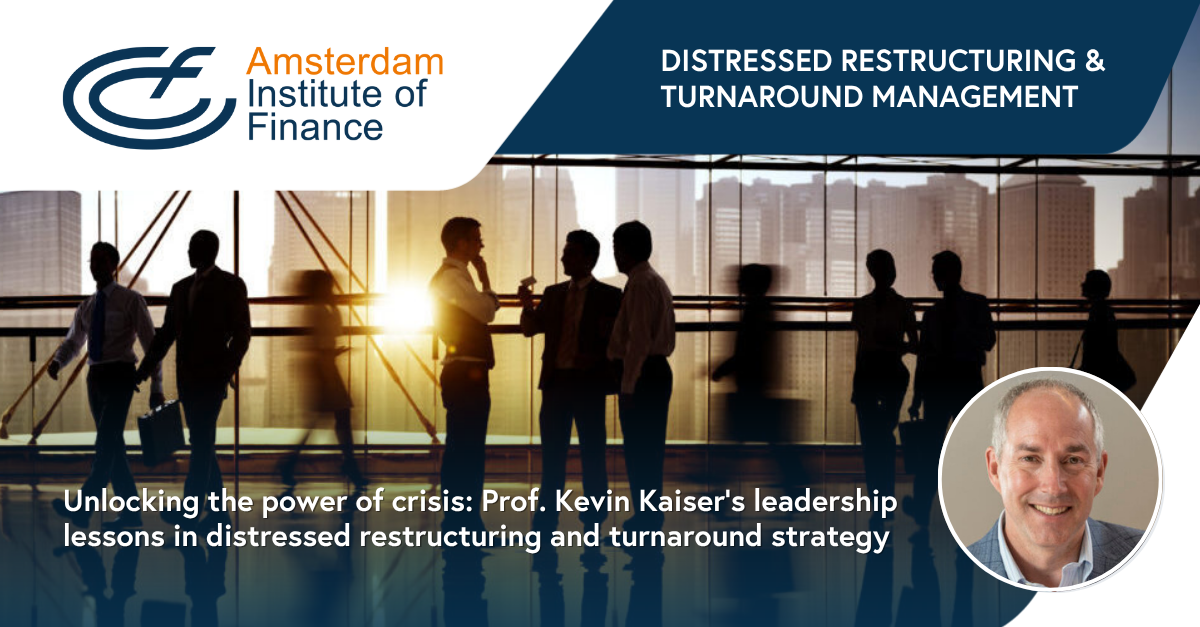
“A whole new worldview in four days.” That’s the promise Professor Kevin Kaiser, renowned finance expert and professor at Wharton School of the University of Pennsylvania, makes to the participants in the Distressed Restructuring and Turnaround Management program at Amsterdam Institute of Finance (AIF). And judging from the depth and pace of day 1, that promise is well on its way to being fulfilled.
After the longest bull market in history, global markets are now facing seismic shifts: rising interest rates, geopolitical uncertainty, and business model disruptions across industries. Understanding how to respond to distress isn’t optional anymore. It’s essential.

This four-day immersive program delivers both the theoretical foundation and hands-on insight into the world of corporate distress, financial restructuring, and turnaround strategy. Guided by Professor Kaiser, participants tackle real-world case studies, explore the behavioral drivers of failure and recovery, and rewire their thinking to lead in the face of adversity.
“There will be huge restructurings during the rest of your lifetime. This program will prepare you not just to survive them, but to seize the opportunity they offer.”
– Professor Kevin Kaiser, Wharton School of the University of Pennsylvania
A snapshot of day 1: Rethinking failure and value
On the opening day, the program wastes no time plunging participants into the complex reality of distress. Topics include:
- Game theory in restructuring scenarios
- Legal frameworks that enable recovery
- Valuation under distress conditions
Kaiser kicks things off by reframing failure itself. In the U.S., bankruptcy laws foster innovation by de-stigmatizing failure: a key driver behind the rise of Silicon Valley and the success of the American economy as a whole. Contrast that with the Soviet model, where bankruptcy was illegal, and the stakes of failure suppressed innovation until the entire system collapsed.
The key lesson? Failure isn’t the problem. Misaligned incentives are.
Incentives: The hidden engine of distress (and recovery)
“Humans follow the path of least resistance”, Kaiser says. “Change incentives, and you change behavior.”
From this perspective, restructuring isn’t just a numbers game – it’s a strategic realignment of purpose, incentives, and execution. Whether examining Nokia’s missed opportunity to pivot, or the flawed acquisition of ABN AMRO by RBS, the core issue often isn’t technical. It’s human.
Participants explore how poor incentives led bankers at RBS to destroy value even as they hit their performance targets. Or how the management at Swissair ignored data until collapse was inevitable.
Real cases, real stakes
Throughout the program, participants engage with in-depth case studies:
- Bayfield Generator – a finance-heavy scenario exploring capital structure.
- Crisis at the Mill – a management-focused turnaround challenge.
- Trump Entertainment Reports – an exercise in complex negotiations.
- The ABN AMRO acquisition – a cautionary tale of overreach and value destruction.
Each case teaches core skills in valuation, turnaround strategy, and stakeholder negotiation, always through the lens of value creation and behavioral awareness.
Kaiser’s analogy captures the spirit of the program: “Skiers learn and perfect their skill. Snowboarders fall, bruise, and try something new. In restructurings, you need to be the snowboarder.”
A mindset for crisis leadership
One of the program’s most powerful takeaways is a mindset shift. Good restructuring leaders don’t assume they’re right. They actively seek disconfirming evidence.
“When you think you’re wrong, you listen, you ask, you analyze. You learn.”
Participants examine the cognitive biases that cloud judgment, like outcome bias, which leads us to judge decisions by results rather than reasoning. They explore how to navigate high-emotion environments and the importance of humility, curiosity, and data in high-stakes decision making.
Final word
In a world where crisis is no longer the exception but the norm, Distressed Restructuring and Turnaround Management at AIF offers more than just tools and techniques, it provides a strategic mindset for value creation under pressure.
If you’re ready to shift from reaction to mastery, this is where your journey begins.
What comes next?
The remaining days build on this foundation:
Day 2 – Value investing & capital structure optimization
Day 3 – Turnaround management
Day 4 – Negotiation & integration
Who should attend?
The Distressed Restructuring & Turnaround Management program is ideal for:
✔ Private equity and family owners facing business restructuring
✔ Managers and directors of businesses facing potential restructuring
✔ Advisors to distressed firms (investment bankers, accountants, lawyers)
✔ Allocators and limited partners evaluating specialized distressed investors
✔ Investors interested in distressed value investing (hedge funds, money management firms)
Prof. Kevin Kaiser teaches both the Distressed Restructuring and Turnaround Management and Advanced Valuation programs at Amsterdam Institute of Finance. Discover Kevin Kaiser’s expertise and programs. Learn more and apply today at AIF.nl.